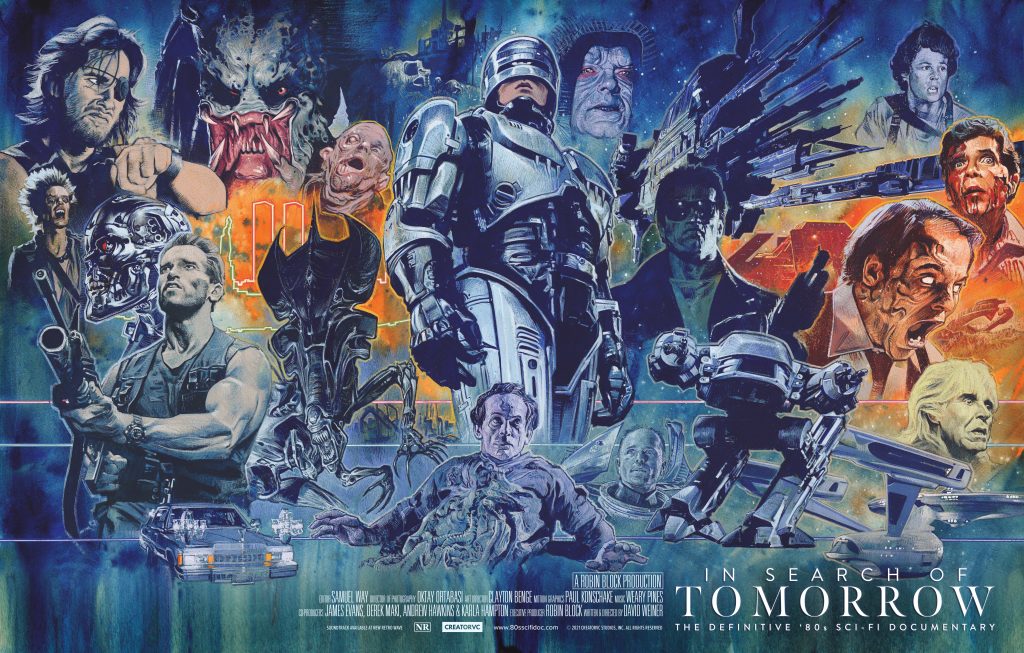David A. Weiner’s latest long-form genre documentary film In Search of Tomorrow takes a look at a smattering of 1980s science fiction films, some immensely popular and others a little more obscure while paying some attention to aspects of fanaticism of the genre and its films.
Following a loose structure divided by year and including some nascent topics and themes, it seeks to surround the peripherals of nostalgia and negate them for the moment, looking at these projects as they were if only for a time. It actively puts in an effort to do more than simply run equivalent to something that is comfortable only just playing the hits and touting its fanaticism. In Search of Tomorrow is not innocent of this by any means, but in examination of why we like these films it tends to peek out. Chalk it up to how effective these stories were to make such an impression on us, let alone finding an audience to celebrate them for nearly five hours.
Categories such as VFX, film scores, and even practical effects get ample investigation into how integral they were to crafting these stories. They helped to make them both applicable to its audiences and for sci-fi to stand on its own despite many voices writing the genre off as childish, not deserving of any real recognition. The documentary opens with a preamble of science fiction’s place in the development of film itself, how it solidified a visual language both for itself and for how other non-sci-fi films would look and behave in their final shots. This is critical to understand how and why the science fiction film has worked so well in commercial and personal realms, and the influence they have.

Because the focus of In Search of Tomorrow is so broad it can’t examine in depth for too long a time but does offer some light backstories to different parts of each film, with each interviewee offering some insight from production to marketing to critical or audience reception. This information passes through well-chosen talking heads (notable subjects include John Carpenter, Wil Wheaton, Corey Dee Williams, Clancy Brown, and Alex Winter to name a few) ranging from the commonplace to the truly enlightening. There is a lot of insight into the films chosen for the decade but because the structure is so committed to moving at a high pace, one of science fiction’s most important ingredients is largely glossed over.
By limiting itself to only the decade of the ’80s In Search of Tomorrow can’t realistically get into the true historical context of science fiction’s film & sociopolitical history. The impact on society and the commentary it provided for events taking place in the world was and still is huge. Themes of division, oppression, as well as the split of pessimism versus optimism point towards different outcomes in the future; the aftermath of potential conflicts that happened alongside society loomed overhead, weighted in darkness touched by reality.

Director David Weiner’s focus is decidedly spent more on a smaller, more individual scale of cultural impact. These films, which sometimes intersected with the marketability of science fiction’s appeal, eventually mixed with an all-time high of popularity across the commercial spectrum. A point could be made here that the intentions these films signaled were rather unfortunately misread (innocently or deliberately), interpreted as a form of escapism only with no room to read as an earnest attempt to try to understand our own world better. Most of the stories read this way were then commercialized to their extremes and sold to an entirely different demographic that had virtually no connection to their intended points and themes the original films were making.
Weiner’s In Search of Tomorrow makes an effort to connect a large swathe of personally, culturally, and idealistically important science fiction concepts to real-world inspiration and applications by beginning to explore the genre’s influence on the scientific field. More specifically it focuses on the advent and unique challenges of space travel but by investing the same wide-eyed hopefulness that films such as Star Trek or Star Wars evoke from its fans about the possibilities of contact. However in-depth it would explore the genre’s themes the one emerging titanic will always be hope, and the circumstances it creates when people believe in it, not to mention a future to look forward to. It’s feelings such as this that lend In Search of Tomorrow its own sense of warmth and joy, optimism in the face of darkness. Whether fans of sci-fi movies take the documentary head-on for its entire runtime or break it up by its own natural episodic segues, there’s something here for every diehard and neophyte to learn and enjoy. It emphasizes there is more to just remember how these films affect us, but that there is always a new perspective that deserves exploration and celebration.
For more information about In Search of Tomorrow, be sure to subscribe for updates at 80’s Sci-Fi Doc.

Before we let you go, we have officially launched our merch store! Check out all of our amazing apparel when you click here and type in GVN15 at checkout for a 15% discount!
Make sure to check out our podcasts each week including Geek Vibes Live, Top 10 with Tia, Wrestling Geeks Alliance and more! For major deals and money off on Amazon, make sure to use our affiliate link!

Andre is an avid film watcher, blogger and podcaster. You can read their words on film at letterboxd and medium, and hear their voice on movies, monsters, and other weird things on Humanoids From the Deep Dive every other Monday. In their “off” time they volunteer as a film projectionist, reads fiction & nonfiction, comics, and plays video games until it’s way too late.







